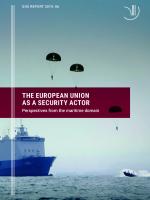The EU as a security actor
In the light of the EU’s recent initiative to step up its Common Security and Defence Policy (CSDP) framework, a new DIIS report by Researcher Jessica Larsen examines the role of the EU as security actor in the maritime domain.
The report analyses the EU’s maritime security operations so far undertaken under the CSDP, the counter-piracy operation ATALANTA in the Indian Ocean and the counter-smuggling operation SOPHIA in the Mediterranean Sea.
The report finds that the EU filled a range of roles at sea, in particular as a:
- first responder, because the EU established operations ahead of other more obvious security actors, such as NATO and the US
- broad responder, because the EU applied its characteristic integrated approach of combining military and civilian policy instruments to address the security issue
- legitimate responder (to some extent), because the EU was able to use its political and diplomatic arm to establish bilateral agreements that sought to ensure the rule of law in operations and engage regional state authorities
While the EU has pursued a comprehensive role in addressing maritime crime, the report argues that the EU on a strategic and operational level is neglecting a range of geopolitical tensions currently playing out in various maritime domains. The report argues that the EU needs to acknowledge this more explicitly. As the EU seeks to step up its common security and defence policy, the report calls for dedicated analysis of and decision-making about how the EU as security actor wishes to face this development and position itself in the maritime domain on both strategic and operational levels.
DIIS Eksperter



